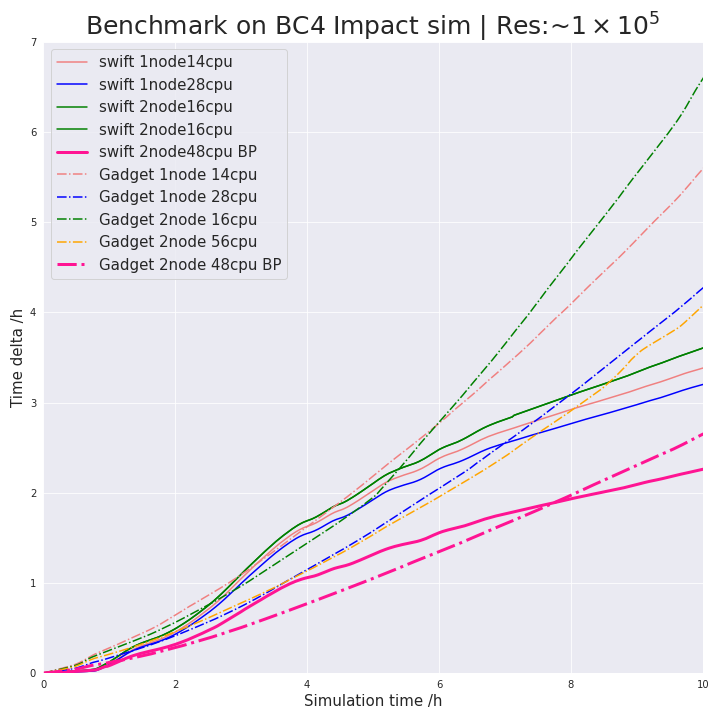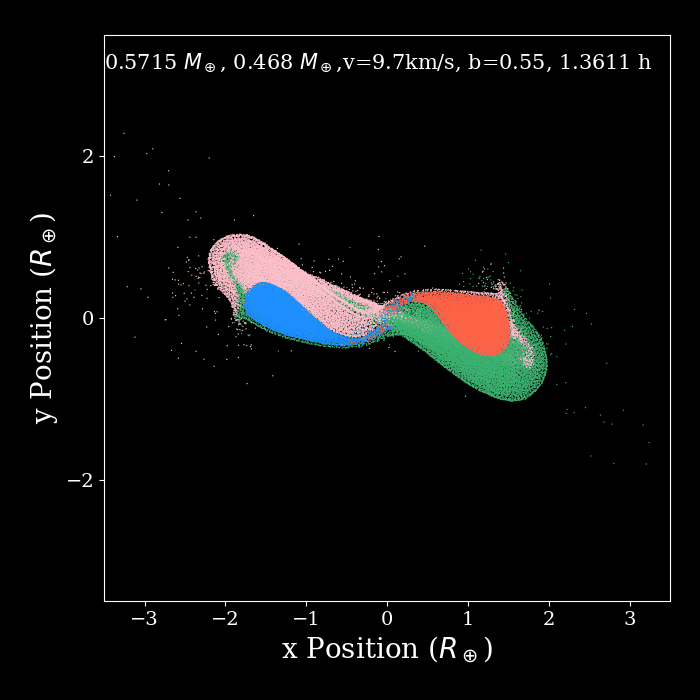SWIFT is a gravity and SPH solver designed to run cosmological simulations on peta-scale machines, scaling well up to 10's of thousands of compute node.
More general information about SWIFT is available on the project webpages.
For information on how to run SWIFT, please consult the onboarding guide available here. This includes dependencies, and a few examples to get you going.
We suggest that you use the latest release branch of SWIFT, rather than the current master branch as this will change rapidly. We do, however, like to ensure that the master branch will build and run.
This GitHub repository is designed to be an issue tracker, and a space for the public to submit patches through pull requests. It is synchronised with the main development repository that is available on the ICC's GitLab server which is available here.
Please feel free to submit issues to this repository, or even pull requests. We will try to deal with them as soon as possible, but as the core development team is quite small this could take some time.
We would like to emphasise that SWIFT comes without any warranty of accuracy,
correctness or efficiency. As mentioned in the license, the software comes
as-is and the onus is on the user to get meaningful results. Whilst the
authors will endeavour to answer questions related to using the code, we
recommend users build and maintain their own copies. This documentation contains
the most basic information to get started. Reading it and possibly also the
source code is the best way to start running simulations.
The users are responsible to understand what the code is doing and for the results of their simulation runs.
Note also that the values of the parameters given in the examples are only indicative. We recommend users experiment by themselves and a campaign of experimentation with various values is highly encouraged. Each problem will likely require different values and the sensitivity to the details of the physical model is something left to the users to explore.
The SWIFT code was last described in this paper: https://ui.adsabs.harvard.edu/abs/2023arXiv230513380S. The core solver, the numerical methods as well as many extensions where described there. We ask users running SWIFT for their research to please cite this paper when they present their results.
In order to keep track of usage and measure the impact of the software, we kindly ask users publishing scientific results using SWIFT to add the following sentence to the acknowledgment section of their papers:
"The research in this paper made use of the SWIFT open-source simulation code (http://www.swiftsim.com, Schaller et al. 2018) version X.Y.Z."
with the version number set to the version used for the simulations and the reference pointing to the ASCL entry of the code: https://ascl.net/1805.020.
The SWIFT source code uses a variation of the 'Google' formatting style. The script 'format.sh' in the root directory applies the clang-format-13 tool with our style choices to all the SWIFT C source file. Please apply the formatting script to the files before submitting a pull request.
Please check that the test suite still runs with your changes applied before submitting a pull request and add relevant unit tests probing the correctness of new modules. An example of how to add a test to the suite can be found by considering the tests/testGreeting case.
Any contributions that fail any of the automated tests will not be accepted. Contributions that include tests of the proposed modules (or any current ones!) are highly encouraged.
Welcome to the cosmological hydrodynamical code
______ _________________
/ ___/ | / / _/ ___/_ __/
\__ \| | /| / // // /_ / /
___/ /| |/ |/ // // __/ / /
/____/ |__/|__/___/_/ /_/
SPH With Inter-dependent Fine-grained Tasking
Version : 1.0.0
Website: www.swiftsim.com
Twitter: @SwiftSimulation
See INSTALL.swift for install instructions.
Usage: swift [options] [[--] param-file]
or: swift [options] param-file
or: swift_mpi [options] [[--] param-file]
or: swift_mpi [options] param-file
Parameters:
-h, --help show this help message and exit
Simulation options:
-b, --feedback Run with stars feedback.
-c, --cosmology Run with cosmological time integration.
--temperature Run with temperature calculation.
-C, --cooling Run with cooling (also switches on --temperature).
-D, --drift-all Always drift all particles even the ones
far from active particles. This emulates
Gadget-[23] and GIZMO's default behaviours.
-F, --star-formation Run with star formation.
-g, --external-gravity Run with an external gravitational potential.
-G, --self-gravity Run with self-gravity.
-M, --multipole-reconstruction Reconstruct the multipoles every time-step.
-s, --hydro Run with hydrodynamics.
-S, --stars Run with stars.
-B, --black-holes Run with black holes.
-k, --sinks Run with sink particles.
-u, --fof Run Friends-of-Friends algorithm to
perform black hole seeding.
--lightcone Generate lightcone outputs.
-x, --velociraptor Run with structure finding.
--line-of-sight Run with line-of-sight outputs.
--limiter Run with time-step limiter.
--sync Run with time-step synchronization
of particles hit by feedback events.
--csds Run with the Continuous Simulation Data
Stream (CSDS).
-R, --radiation Run with radiative transfer.
--power Run with power spectrum outputs.
Simulation meta-options:
--quick-lyman-alpha Run with all the options needed for the
quick Lyman-alpha model. This is equivalent
to --hydro --self-gravity --stars --star-formation
--cooling.
--eagle Run with all the options needed for the
EAGLE model. This is equivalent to --hydro
--limiter --sync --self-gravity --stars
--star-formation --cooling --feedback
--black-holes --fof.
--gear Run with all the options needed for the
GEAR model. This is equivalent to --hydro
--limiter --sync --self-gravity --stars
--star-formation --cooling --feedback.
--agora Run with all the options needed for the
GEAR model. This is equivalent to --hydro
--limiter --sync --self-gravity --stars
--star-formation --cooling --feedback.
Control options:
-a, --pin Pin runners using processor affinity.
--nointerleave Do not interleave memory allocations across
NUMA regions.
-d, --dry-run Dry run. Read the parameter file, allocates
memory but does not read the particles
from ICs. Exits before the start of time
integration. Checks the validity of
parameters and IC files as well as memory
limits.
-e, --fpe Enable floating-point exceptions (debugging
mode).
-f, --cpu-frequency=<str> Overwrite the CPU frequency (Hz) to be
used for time measurements.
-n, --steps=<int> Execute a fixed number of time steps.
When unset use the time_end parameter
to stop.
-o, --output-params=<str> Generate a parameter file with the options
for selecting the output fields.
-P, --param=<str> Set parameter value, overiding the value
read from the parameter file. Can be used
more than once {sec:par:value}.
-r, --restart Continue using restart files.
-t, --threads=<int> The number of task threads to use on each
MPI rank. Defaults to 1 if not specified.
--pool-threads=<int> The number of threads to use on each MPI
rank for the threadpool operations.
Defaults to the numbers of task threads
if not specified.
-T, --timers=<int> Print timers every time-step.
-v, --verbose=<int> Run in verbose mode, in MPI mode 2 outputs
from all ranks.
-y, --task-dumps=<int> Time-step frequency at which task graphs
are dumped.
--cell-dumps=<int> Time-step frequency at which cell graphs
are dumped.
-Y, --threadpool-dumps=<int> Time-step frequency at which threadpool
tasks are dumped.
--dump-tasks-threshold=<flt> Fraction of the total step's time spent
in a task to trigger a dump of the task plot
on this step
See the file examples/parameter_example.yml for an example of parameter file.









